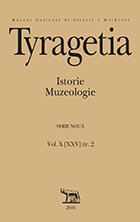Reflecţii istoriografice privind statutul ruptaşilor din Basarabia sub dominaţie ţaristă (anii 1812-1847)
Historiographical considerations regarding the status of ruptashi in Bessarabia under Tsarist domination (1812-1847)
Author(s): Valentin TomuleţSubject(s): History
Published by: Muzeul Naţional de Istorie a Moldovei
Keywords: Bessarabia; ruptashi; rupta de vistierie; rupta de cămară; social category; fiscal category; the Russian Empire
Summary/Abstract: In this article, without touching the status and evolution of the fiscal category of ruptashi considered by the author in previous articles along with the category of mazyli, there is analyzed a long and varied process of this category understanding by different researchers in new and modern historiography, which indirectly or specifically focused on this topic.Analyzing the existing concepts, the author comes to the conclusion that almost all researchers in the 19th-early 21st centuries consider the ruptashi a privileged class: the ancestors of foreign colonists - Bulgarians, Serbs, and others, who settled in the area during the time of the Moldavian government; farmers who have been from the category of clergy and ministers of the church by origin. Rupta de vistierie and rupta de cămară were equated with raznochinsy; rupta de vistierie paid taxes to the treasury, and rupta de cămară - personally to the rulers (cămara). After the annexation of the territory by Russia ruptashi lost almost all their privileges and social prestige. Most researchers tend to see in ruptashi a social category, while in reality they were a fiscal category.
Journal: Tyragetia (Serie Nouă)
- Issue Year: X/2016
- Issue No: 2
- Page Range: 135-147
- Page Count: 13
- Language: Romanian

